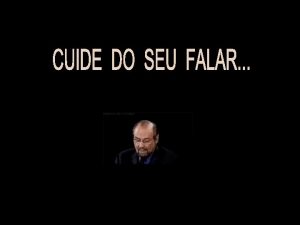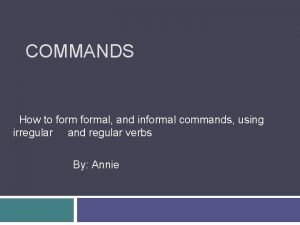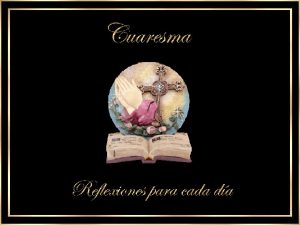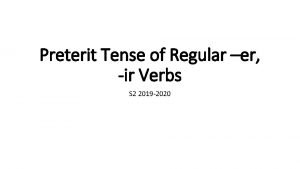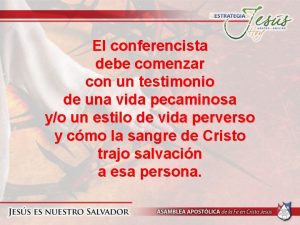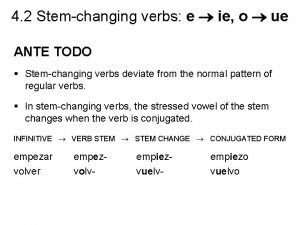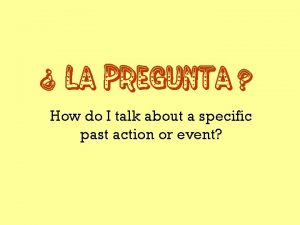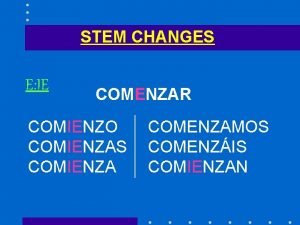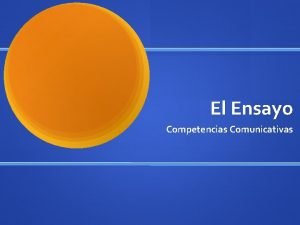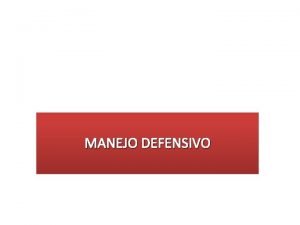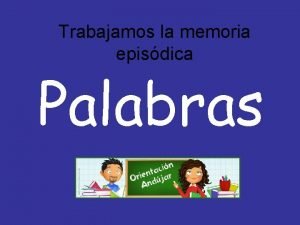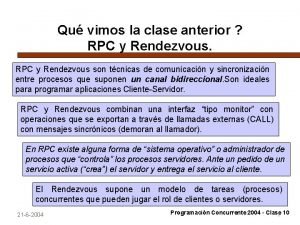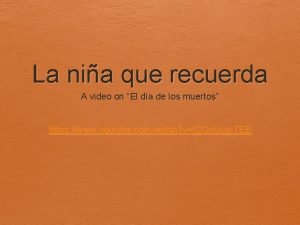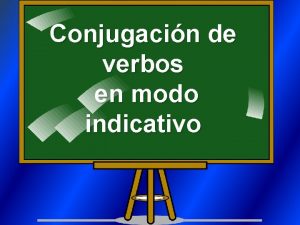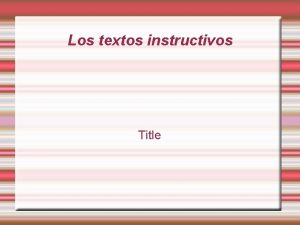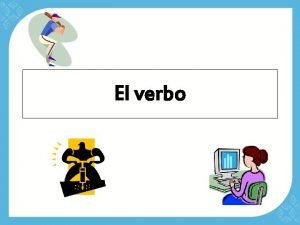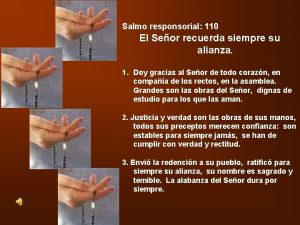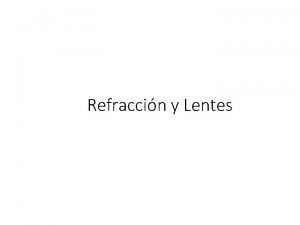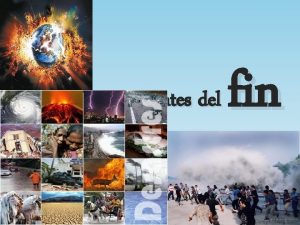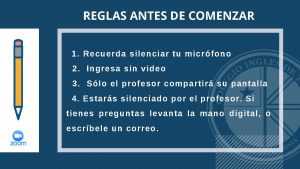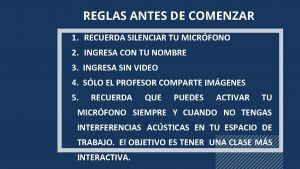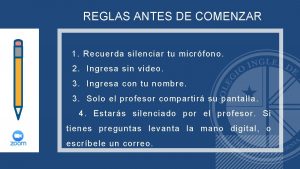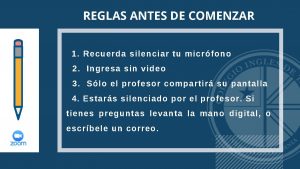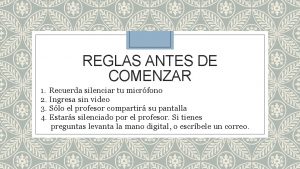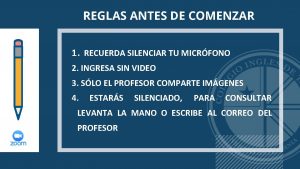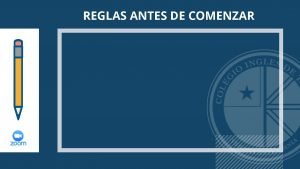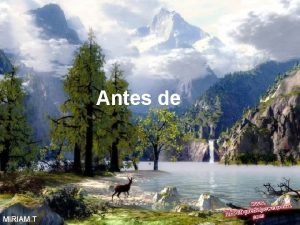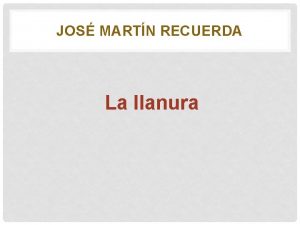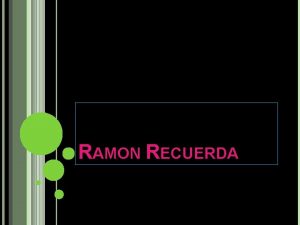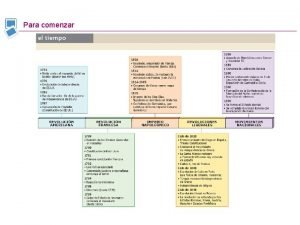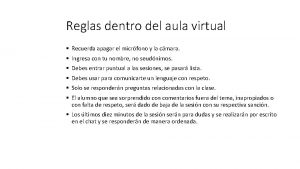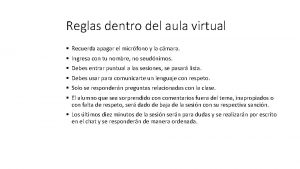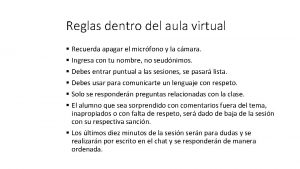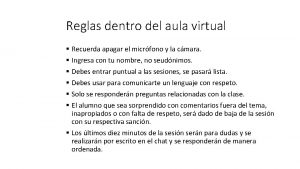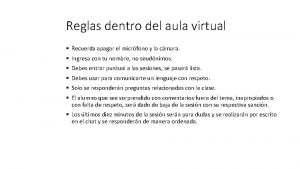REGLAS ANTES DE COMENZAR 1 Recuerda silenciar tu




















- Slides: 20

REGLAS ANTES DE COMENZAR 1. Recuerda silenciar tu micrófono. 2. Ingresa sin video. 3. Ingresa con tu nombre. 3. Solo el profesor compartirá su pantalla. 4. Estarás silenciado por el profesor. Si tienes preguntas levanta la mano digital, o escríbele un correo.

DATE: Friday, May 29 th LESSON OBJECTIVE: To determine articles in a sentence. To identify Writing styles for PET. Recommendations: • Get your notebook and a pen/pencil. • Be ready to answer questions. Some answers must be written in the chat box, and in others you will have to speak. • Use English! Type your questions and answers in English, and try to use English when you speak.

A / an (indefinite article) A/an is used to mention one thing for the first time. We can only use it with countable singular nouns. My husband has a bicycle. The bicycle is red. My husband has two dogs. One dog is black, and the other is brown.

A / an (indefinite article) There is a car in the street. A and an are almost the same. The only difference is in the word after them. There is an old car in the street. An umbrella A university A hotel An hour

Let’s practice! Is it a or an? Pay attention to the first sound of the words. 1. _____ dog 7. _____ hotel 2. _____ apple 8. _____ hour 3. _____ star 9. _____ unicorn 4. _____ elephant 10. _____ elegant restaurant 5. _____ elf 11. _____ book 6. _____ box 12. _____ old book

A/an vs the Look at these examples. Taken from: Essential Grammar in Use, Raymond Murphy. CUP

A/an vs the Compare the examples. • I will play with a dog. (any dog, not mine) • I will play with the dog. (my dog; an specific dog). • Can I ask a question? (there are many questions) • Can I ask the question? (there is only one question) • London is a capital. (There are many capitals). • London is the capital of England. (There is only one capital).

The (definitive article) • • We have to use “the” in these situations. The moon is beautiful tonight. The internet is slow. The Earth is the third planet. The sea is quiet. Unique objects • The rich are getting richer. • The orange ones are beautiful. Groups of people/things • The Romans invaded Greece. • The Italians came to Chile. Some nationalities • I play the guitar. • María can play the violin. Musical instruments

Zero article • • In some cases, we do not need to use an article. This is very common in English, but not in Spanish. I go to ∅ school everyday. Martha is in ∅ hospital. My brother is at ∅ university. On Sunday, I went to ∅ church. Institutions • ∅ Dogs are nice. • I don’t like ∅ spiders. • ∅ Babies are cute. Groups in general • I’m making ∅ breakfast. • Did you eat ∅ lunch? • I have classes on ∅ Monday. Meals/days

Story

Story • Title: The title should summarize the full story (no spoilers!) Or at least be related to the main theme. • Presentation: This is the beginning of the story, where the characters and the place of action are presented. It's basically the introduction to the next part, the knot, and the plot of the story. • Knot: In this part the characters face the main action and look for ways to solve the plot. • Outcome: This is where the action works out and the story ends with an ending, usually with no loose ends.

Useful phrases It all began… When I first… At the beginning… It was a hot summer/cold winter day. Then (Entonces) After that (Después de eso) Not long aftewards As soon as While Meanwhile As Some time later A little later ____ minutes later a moment later Later (that morning/afternoon/day/night…) Just then

Example

What is an article? Imagine that you know a lot about a specific topic. It may be something that you like or something you have read about. Maybe you have watched many videos about the topic and would like to share what you know with others. - likes, dislikes. - personal experiences. - opinions related to topics you are informed about. - What topics do you think people are interested to read about?

Articles - Title What should they include? - Introduction - Idea 1 - Possible idea 2 - Conclusion/closing

Example of information required

Example:

Identify the structure and possible mistakes: Don’t you enjoy eating out? Do you ever get tired of laying the table? Do you enjoy to wash the dishes? I really don’t. That’s why I believe eating out is great. I know that eating out is expensive, but do it a couple of times a week. Instead of spending money in nightclubs or clothes, I’d rather spend money in _____ good restaurant, because the food is nice and it’s convenient. I love going to ____ restaurants but my sister likes _____ restaurant located next to our house because it’s great! My favorite restaurant is usually Italian (I love _____ pasta!), but my favorite restaurant in my city is _____ Japanese restaurant called «Kirin» . They serve ______ best sushi! I don’t tolerate to eat bad sushi. If you are ever in my city, I recommend you go to Kirin or any of the Italian restaurants in _____ center. You won’t regret it!

Summary • A/an are used when we first mention one thing. We can only use them with singular objects. • A/an must be used based on the pronunciation of the next word. • The is used when we already know the object. • The is used in some specific situations. • We use zero article in many situations. • Articles are related to topics we know a lot about. • Stories include a problem that has to be solved in the end. What is more difficult about writing a story/an article?

carias@colegioingles. cl
 Antes de falar escute antes de escrever pense
Antes de falar escute antes de escrever pense Comenzar formal command
Comenzar formal command Señor me cuesta comenzar este dia
Señor me cuesta comenzar este dia Comenzar verb chart
Comenzar verb chart Como comenzar un testimonio
Como comenzar un testimonio Comenzar stem change
Comenzar stem change Vivir conjugation chart
Vivir conjugation chart Stem changing comenzar
Stem changing comenzar Como enviar un correo formal
Como enviar un correo formal Desarrollo en ensayo
Desarrollo en ensayo Señales de transito y su significado
Señales de transito y su significado Recuerda las siguientes palabras
Recuerda las siguientes palabras Que vimos la clase anterior
Que vimos la clase anterior Concepto de poema recuerda incluir
Concepto de poema recuerda incluir La nina que recuerda
La nina que recuerda Recuerda es un verbo
Recuerda es un verbo Recuerda que son los textos instructivos
Recuerda que son los textos instructivos Tres modos verbales
Tres modos verbales Salmo responsorial 110
Salmo responsorial 110 Foco real y virtual
Foco real y virtual Mateo 24 23-24
Mateo 24 23-24
